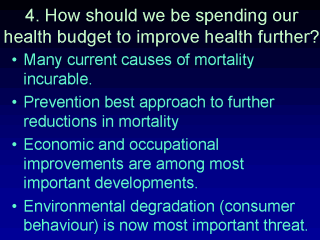| front |1 |2 |3 |4 |5 |6 |7 |8 |9 |10 |11 |12 |13 |14 |15 |16 |17 |18 |19 |20 |21 |22 |23 |24 |25 |26 |27 |28 |29 |30 |31 |32 |33 |34 |35 |36 |37 |38 |review |
 |
What does all
this suggest for the way we should be spending our money on health? In HK, 90% of the
money allocated to health care is spent by the hospital authority, and only 10% goes to
the Department of Health. There are other areas that receive funding not explicitly under
the health care budget, which make an important contribution to health, such as education,
social services, urban services, such as sanitation and infra-structural maintenance
including water and sewerage. When we look at the current dominant causes of mortality, they are all mostly incurable (which is one reason why they are the dominant causes of mortality). This means that prevention is the more effective approach to reduce the prevalence of these diseases. Economic, educational and occupational improvements are very important in improving health, but past a certain point, they can begin contributing to the problem they are trying to erase. Unrestrained population growth coupled with rampant consumerism now poses the greatest threat to health trends. Increased pollution, growing competition for scare resources, including water and land, excessive environmental contamination by man-made chemicals such as hormone analogues, destabilization, migration and war are the most important health threats that need to be tackled. |